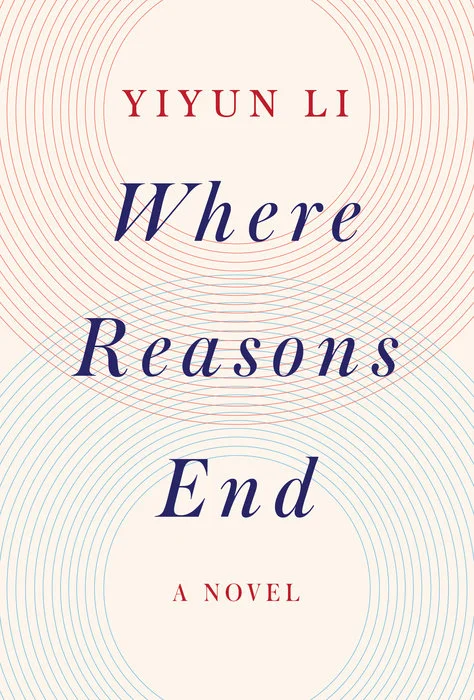REVIEW: A Searing Novel About a Mother Dealing With the Greatest of Losses
/Where Reasons End by Yiyun Li
Random House, 192 pp.
By Heather Scott Partington
Shortly after losing her son to suicide, Yiyun Li wrote Where Reasons End, a novel that is an imagined dialogue between a woman and her son, Nikolai, who has recently killed himself. “It’s so sad I have no other adjectives left,” Li writes. The tale is heartbreaking, but also fascinating; Li’s relentless, disquisitive style -- demonstrated most recently in her 2017 memoir, Dear Friend, From My Life I Write To You In Your Life -- is here applied to her most tender emotions and deeply ingrained patterns of language.
Li gives Nikolai a voice and precocious personality, yet we are never allowed to forget that he is imagined. He is his mother’s inception, and in turn, they both spring from Li’s mind. The author, a Chinese-American writer and former scientist, has written of her own struggles with depression and two suicide attempts. “I have been writing to prepare myself my entire career…” Li’s narrator says, audacious and resolute.
It’s impossible to separate writer from narrator, though Li, who admits in her previous work that she reads authors through a biographical lens, seems to recognize the irony. Where Reasons End is built on paradoxes of parenting and language, both of which Li asserts are imperfect, though necessary. “If you write about suffering,” Nikolai asks, “if you understand suffering, why did you give me a life?” Just as language is imperfect and unable to convey true meaning, parents are able to create life but unable to protect it. “To love,” she writes, “is to trespass.”
Li’s narrator struggles throughout Where Reasons End to accept both the fallibility of language and her complicity in bringing a son into a world without ultimately being able to protect him. “We feel at a loss for words when they can’t fully do what we want them to.” The narrator’s conversations with her dead son serve to illuminate her own insecurities and discomfort with language as much as they demonstrate her poetic facility.
Li’s narrator is obsessive about the meaning of words, peeling away at the etymology and denotation of each one: “Every word has ten more definitions I have missed,” she tells Nikolai. “Nobody says you have to know all the definitions,” he says. “What if one could only make sense with those missing definitions?” asks his mother.
Where Reasons End reads like a long poem; Li utilizes the ambiguity and imperfection of words to comment on the ineffectiveness of language, but also as a topic of conversation between mother and son. In each of their disagreements, Li challenges the basis of her writing style, linguistic tendencies, and worldview. As much as any piece of fiction is a product of the author talking to him- or herself, the effect is compounded in Li’s mother/son scenario. We can’t ever forget that her art, no matter how philosophical, no matter how linguistically lithe, mirrors this same tragedy in Li’s own life. By shifting the conversation into the realm of fiction, Li makes the ineffable both tangible and ordinary, and thus more easily dissected.
Metaphor, too, is challenged by Li’s work. Memory and the symbolic aspects of language are inexact, and literature’s reliance on our mind’s ability to connect disparate phenomena is both a balm and a blade for the author. Li’s narrator rejects the language others offer her. “Words provided to me--loss, grief, sorrow, bereavement, trauma--never seemed to be able to speak precisely of what was plaguing me.”
Even in her conversations with Nikolai, she challenges the iconography of her own memories, including the language she associates with each experience. In one moment discussing a story from his youth, the two debate the efficacy of nouns versus adjectives. Which has more meaning? “It’s the adjective prodigal that tells the story, he said, not the blueberries.” She responds: “But prodigal wouldn’t give me back memories of Nikolai as blueberries would.” This noun/adjective debate threads through their conversation.
Where Reasons End exists in a timeless void, indicating, by contrast, the perpetuity of Li’s loss. “For one thing, I had made time irrelevant,” Li says, revealing her sensitivity to the conceit. “Are we in aftertime then?” she asks her son. “I am,” he says, unreachable, “but not you.” There’s a gluttonous, indulgent feeling to their conversations; it becomes easy to understand why Li’s narrator creates a new kind of intimacy to replace one she will never have again. This all loops back into Li’s discussion of language, as she explicates tense, too: “Yet what makes was different from is, has been from will be? Timeless is this world we are making, tenseless its language.” Language is impossibly inadequate, and still it is only through language that she can continue the conversation with her son, and immortalize him in her prose.
Li leaves us wanting more, but that yearning seems to be the point. Li’s work is as singular as it is devastating. She writes, “I loved that his ambition and conceit would remain as young as he was,” and we’re left with the feeling that her narrator’s son, relegated to the realm of her fiction, has become art rather than the person he once was. He endures--beautiful and precocious--but only because he did not survive.
Heather Scott Partington is a writer, teacher, and book critic. She is the winner of an emerging critic fellowship from the National Book Critics Circle. Her writing has appeared in The New York Times Book Review, The Washington Post, USA Today, The Los Angeles Times, and The Los Angeles Review of Books. Heather has served as a contributor to Goodreads, Las Vegas Weekly, Electric Literature, Ploughshares, and Kirkus. She teaches high school English and lives in Elk Grove, California, with her husband and two children.










